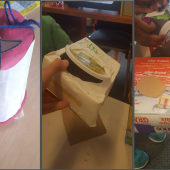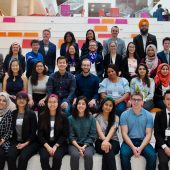
Abstract: This case study illustrates a cross-curricular learning experience, anchored in standards, where teachers and students actively engaged in co-constructed, inquiry-based learning and design thinking. The particular question this case study addressed was “How might students connect with environmental citizenship in authentic ways through media literacy experiences?” Specifically, the case study invited primary level learners to engage in a multimodal experience that was anchored in media literacy concepts and process. A pedagogical approach rooted in media literacy theory subsequently empowered students to make positive environmental changes in their communities and develop citizenship skills for the future. The project sought to develop awareness of sustainability through analysis, re-design, and production of snack food packaging. Educator reflections offer ideas for project improvement, such as producing for a wider audience, offering more choice, and making broader subject connections. This case study has implications for practice by demonstrating that, through various stages of scaffolding and integrated lesson design, young children are capable of applying sophisticated media literacy theory, inquiry, and design thinking to meet multiple curriculum standards.
Continue Reading
The Calgary Interprofessional Challenge (CIC) engages university students across disciplines in a novel 44-hour hackathon based on faculty and peer-to-peer interprofessional education. CIC uses short introductory talks on problem-solving in different faculties, a series of workshops, and expert mentorship from university faculty, relevant specialists, and entrepreneurs as its core curriculum. A recent offering of CIC used the campus as a learning lab by focusing on a sustainability challenge at our university. The CIC model can be replicated at other campuses to advance sustainability, while cultivating interprofessional and sustainability practice competencies such as stakeholder engagement, group collaboration, and understanding of different worldviews and relationships.
Continue Reading